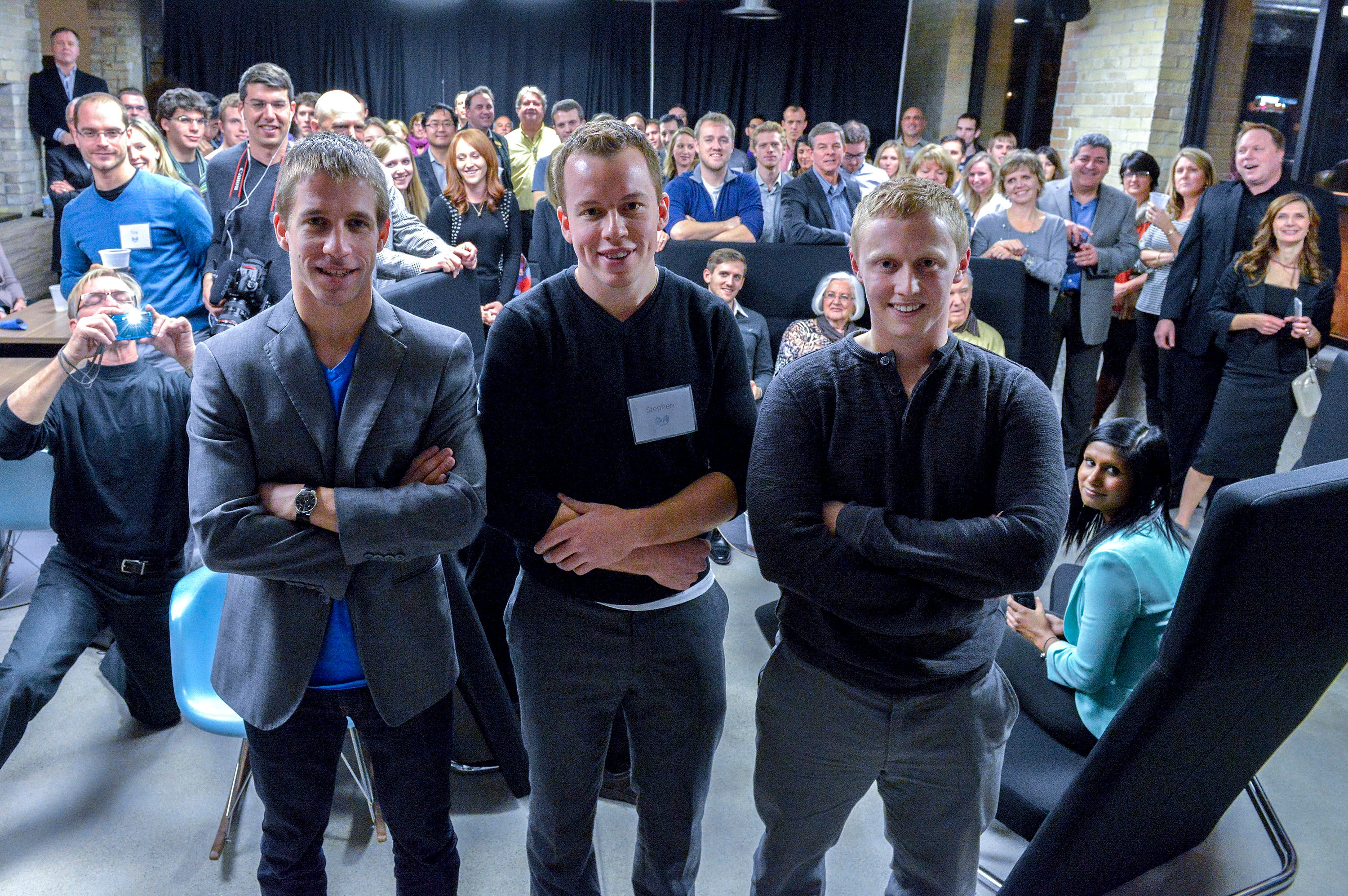
Written by Stephen Lake, Matthew Bailey, and Aaron Grant (BASC '12)
Stephen Lake, Matthew Bailey, and Aaron Grant are the co-founders of one of Canada’s hottest start-ups, Thalmic Labs. Their product, the Myo gesture control armband, uses electromyography (EMG) and motion sensors to transform your arm into a remote control.
Alumni Relations had the opportunity to speak with the three graduates of the UWaterloo Mechatronics Engineering Class of ‘12, about taking Thalmic Labs from the Velocity Garage, to $14.5 Million in Series A Funding from Spark Capital and Intel Capital.
What was memorable from your days at UWaterloo that impacted your later entrepreneurial or business perspectives?
UWaterloo engineering is an intense experience. Hands-on projects nearly every semester push you to try your hand at solving difficult challenges, and to further your own capabilities and knowledge. Many of these projects are done together with (or alongside) your classmates, and involve long days/nights/weeks/months of work. Through these projects, you learn who you work well with and build deep friendships with your classmates.
Working through these projects is in many ways like the early days of a start-up, which made the jump from graduation directly into starting a company an easy one to make. It was actually one of those projects that first sparked our interest in wearable computing: our final year “capstone” project was a wearable device to help the blind navigate the world. Digging into the research eventually led us to the realization that wearable computers are going to be a big part of the future, and that we needed to re-think the interfaces we use to interact with them.
Voice was out; no one wants to talk to themselves at a bus terminal, and it can be cumbersome for many tasks. Camera-based gesture recognition works, but only if you’re standing in a room with a camera trained right at you. We needed a way to give gesture-based commands to a device without slowing the user down, and quickly learned that electromyographic (EMG) sensors picking up electrical activity from your muscles had incredible potential to make the user into a remote control. The Myo armband was born.
What are you working on or developing/playing with these days?
We could tell you, but we’d have to kill you.
Seriously though, at Thalmic Labs we’re focused on getting the Myo successfully to market; putting a product in consumer’s hands that solves problems they face every day. We’re also working hard with developers to unlock the potential of the Myo armband; they’re dreaming up uses we haven’t even considered yet. It’s a whole new paradigm of machine-human interaction, and developers are hard at work building devices and applications ready to talk to your hands.
We have tons of ideas at Thalmic Labs for how to more closely couple humans and technology, but we’re not ready to announce anything just yet.
Did you have any mentors to guide you through the world of entrepreneurship?
Absolutely. We have a wide network of mentors who have been invaluable guiding us through the entire process from inception to our company today. A huge part of this network is right here at home: UWaterloo itself, and the start-up ecosystem here in Kitchener-Waterloo. Being surrounded by smart people with mind-bending new ideas and bold visions for the future tends to rub off on you in a place like this.
It isn’t just moral support either. We spent our first year in the Velocity Garage which really helped us kick-start our business, giving us access to a workspace and resources that we would never have had otherwise. After we maxed out our credit cards and student lines of credit, we earned a Velocity Venture Fund through the University of Waterloo and got accepted into the Y Combinator winter 2013 class. We started getting interest from venture capital investors after that and they helped take our business to the next level, but that early injection of cash from UWaterloo’s Velocity program was absolutely crucial in getting off the ground.
Do you have any advice that you would like to share with aspiring entrepreneurs at UWaterloo?
Get the right team in place before you try to do anything. We’ve been fortunate: our network yielded a great team from the beginning, with a nice balance of skills and authentic friendships between team members. But Jim Collins hit the nail on the head: “start by getting the right people on the bus, the wrong people off the bus, and the right people in the right seats.” It will make all the difference.